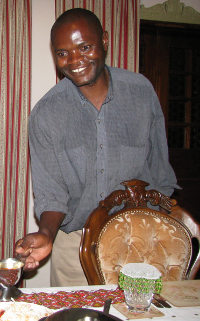
For a few seconds I try to clear my mind enough to comprehend the meaning of the sound. It is far too early in the morning, and for a moment I cannot identify the sound. Then my head begins to clear, and I realize what is taking place near my window.
The afternoon before we had traveled to the site for the new MIBI (Malawi International Biblical Institute). The dirt road combined with unexpected rainfall made our small car look like it had gone through a mud bath, and all of the mud was still clinging to it.
The sound is Elias Mwale, outside the house at 5:15 in the morning, washing the car. We had told him the night before we would leave around 7 AM for a trip to the southern region of Malawi, and he is insuring we will have a nice clean car for the journey. I lay there listening for a time, trying to think of all of the ways he has performed acts of kindness for us during the past 11 years. There is no way. I cannot count all of them if I stay in bed writing them down all day.
Elias was born on the 19th of July 1974. He tells how his grandfather put their family house in a tree to avoid the lions in 1976. He would run from them, and the family would build fires around their gardens, in order to keep the lions and elephants out of their food supply. Although the elephants and lions have left the area in recent years, there are still baboons that tear through the village almost every day.
Elias is a blood descendent of tribal royalty. His brother is a Chewa chief, Yhonne (John) Mwale, and his uncle is also a chief from the village of Ndhondo Ndhondo, in the northeastern part of Malawi.
Dick Stephens, one of the founders of the Malawi Project recalls, “We met Elias in 1999. He was serving on a construction crew for the building of a hospital the Malawi Project was helping build and finance. The following year he requested a transfer so he could assist us during our stays in Malawi. What appeared to be a small job, soon turned into a servant ministry. Teams stated coming and what started as a few soon turned in dozens, and hundreds a year. He willingly and with great devotion jumped into cooking and cleaning and finding every way possible to help the visitors from other lands. He also became our cultural advisor, trip coordinator, day planner, and ‘chief engineer’, on many of the things we needed to carry out in the various projects we had undertaken.”
Suzi Stephens, the Medical Director and co-founder of the Project picks up on the story, “By July 2004 when the first teams start coming from other parts of the world to assist in the construction of the hospital, an orphan village and a food processing and distribution plant, Elias is ready. We studied language together, and he had gone from a few words of English, to being able to communicate extensively in the language of the visitors. He was the perfect Ambassador of Malawi as he welcomed each visitor to the Warm heart of Africa. He also watched the construction projects going up around him, and with a near photographic memory recorded the location of every underground pipe laid on the property. Size and location could elude everyone except Elias. ‘I am assistant Chief Engineer,’ he would proudly announce to friends and visitors alike. And the title was quite true. It seemed Elias could do almost every thing. Whether it was electrical work, carpentry, or plumbing repair; if it needed to be done he was the man who would jump in and do it. When it came to meals he was an intricate part of preparation and serving meals to as many as 42 at a time and then he stayed to clean up after the guests,” Suzi recalls.
“I remember so well the time one of the workers, Thomas, was hit by a truck while working at the hospital. He had a severe hip fracture. During his recovery, and with a view to how close he had come to dying, he asked to be baptized. Everyone went to the Lumbadzi River 2 kilometers away, and watched as Elias carried Thomas down the riverbank on his back in order for immersion to take place. Then he carefully and gently carried Thomas back up on the bank.”
It is no wonder Elias is such a good servant. For one thing it is just who he is; He loves life and loves serving others, but it is also a reflection of his Christianity. Elias was baptized into Christ on the 22nd of October 2002. He had insured his servant heart in the waters of baptism in a river near Lumbadzi, Malawi, and he takes his commitment to Christ seriously. His wife, Elfrida followed suit on the 6th day of Sept 2008 when she was baptized in the same river near Lumbadzi.
By a few minutes after 7 Elias finishes washing the car, preparing our meal, and smilingly waves us off as we leave for southern Malawi. His words, as we had entered the dinning room, still dance across my memory, “Cup tea, cup tea, two minutes.” In a culture that does not see time as important, Elias learned the need to keep the western visitor within their familiar time constraints while visiting his land.
